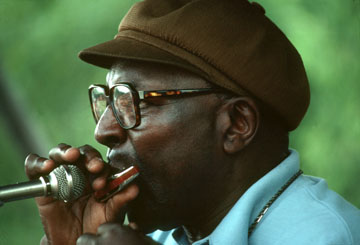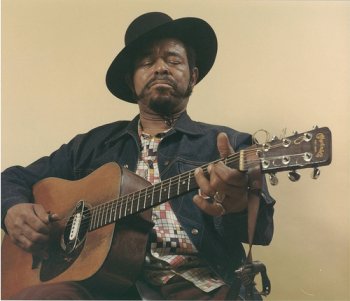| B i o g r a p h y |
 Saunders Terrell, better known as Sonny Terry
(24 October 1911, Greensboro, North Carolina - 11 March 1986, Mineola,
New York) was a blind blues musician. He was most widely known for his
energetic blues harmonica style, which frequently included vocal whoops
and hollers, and imitations of trains and fox hunts. His father, a
farmer, taught him to play basic blues harp as a youth. He sustained
injuries to his eyes and lost his sight by the time he was 16, which
prevented him from doing farm work himself. In order to earn a living
Terry was forced to play music. He began playing in Shelby, North
Carolina. After his father died he began playing along with
Piedmont-style guitarist Blind Boy Fuller. When Fuller died, he
established a long-standing musical relationship with Brownie McGhee,
and the pair recorded numerous tracks together. The duo became
well-known, even among white audiences, as they joined the growing folk
movement of the 1950s and 1960s. This included collaborations with
Woody Guthrie and Moses Asch, producing Folkways Records (now
Smithsonian/Folkways) classic recordings. In 1938 Terry was invited to
play at Carnegie Hall for the first From Spirituals to Swing concert,
and later that year he recorded for the Library of Congress. In 1940
Terry recorded his first commercial sides. Despite their fame as "pure"
folk artists, in the 1940s, Terry and McGhee fronted a jump blues combo
with honking saxophone that was variously called Brownie McGhee and his
Jook House Rockers or Sonny Terry and his Buckshot Five. Terry was also
in the 1947 original cast of the Broadway musical comedy, Finian's
Rainbow. Terry's song "Fox Chase" was used by the experimental
filmmaker Len Lye as the soundtrack for his short film, Color Cry
(1952). "Old Lost John" was used by Werner Herzog at the conclusion of
his 1977 feature film, Stroszek. More recently Terry's track "Whoopin'
The Blues" was used for a EON Wind Farm brand commercial.Terry died in 1986, the year he was inducted into the Blues Hall of Fame.
Saunders Terrell, better known as Sonny Terry
(24 October 1911, Greensboro, North Carolina - 11 March 1986, Mineola,
New York) was a blind blues musician. He was most widely known for his
energetic blues harmonica style, which frequently included vocal whoops
and hollers, and imitations of trains and fox hunts. His father, a
farmer, taught him to play basic blues harp as a youth. He sustained
injuries to his eyes and lost his sight by the time he was 16, which
prevented him from doing farm work himself. In order to earn a living
Terry was forced to play music. He began playing in Shelby, North
Carolina. After his father died he began playing along with
Piedmont-style guitarist Blind Boy Fuller. When Fuller died, he
established a long-standing musical relationship with Brownie McGhee,
and the pair recorded numerous tracks together. The duo became
well-known, even among white audiences, as they joined the growing folk
movement of the 1950s and 1960s. This included collaborations with
Woody Guthrie and Moses Asch, producing Folkways Records (now
Smithsonian/Folkways) classic recordings. In 1938 Terry was invited to
play at Carnegie Hall for the first From Spirituals to Swing concert,
and later that year he recorded for the Library of Congress. In 1940
Terry recorded his first commercial sides. Despite their fame as "pure"
folk artists, in the 1940s, Terry and McGhee fronted a jump blues combo
with honking saxophone that was variously called Brownie McGhee and his
Jook House Rockers or Sonny Terry and his Buckshot Five. Terry was also
in the 1947 original cast of the Broadway musical comedy, Finian's
Rainbow. Terry's song "Fox Chase" was used by the experimental
filmmaker Len Lye as the soundtrack for his short film, Color Cry
(1952). "Old Lost John" was used by Werner Herzog at the conclusion of
his 1977 feature film, Stroszek. More recently Terry's track "Whoopin'
The Blues" was used for a EON Wind Farm brand commercial.Terry died in 1986, the year he was inducted into the Blues Hall of Fame.
 Walter "Brownie" McGhee
(November 30, 1915 - February 16, 1996) was a folk-blues singer and
guitarist, best known for his collaborations with the harmonica player
Sonny Terry. He grew up in Kingsport, Tennessee and suffered from polio
as a child, which incapacitated his leg. His brother "Stick" got his
nickname from pushing young Brownie around in a cart. McGhee spent much
of his youth immersed in music, singing with local harmony group the
Golden Voices Gospel Quartet and teaching himself the guitar. At the
age of 22 he became a traveling musician, working in the Rabbit Foot
Minstrels and meeting and befriending Blind Boy Fuller, whose guitar
playing influenced him greatly. After Fuller's death in 1941, J. B.
Long of Columbia Records had him adopt his mentor's name, branding him
Blind Boy Fuller II. By that time, McGhee was recording for Columbia's
subsidiary Okeh Records in Chicago, Illinois, but his real success did
not come until his 1942 relocation to New York City, when he officially
teamed up with Sonny Terry, who he had known since 1939. The pairing
was an overnight success, recording and touring together until around
1980. They did most of their work together from 1958 until 1980,
spending eleven months of each year touring, and recording dozens of
albums. Despite their fame as "pure" folk artists, in the 1940s, Terry
and McGhee fronted a jump blues combo with honking saxophone that was
variously called Brownie McGhee and his Jook House Rockers or Sonny
Terry and his Buckshot Five. They also appeared in the original
Broadway productions of Finian's Rainbow and Cat on a Hot Tin Roof.
During the blues revival of the 1960s Terry and McGhee were highly
popular on the concert and festival circuits, occasionally adding new
material but usually remaining faithful to their roots. In 1987, McGhee
gave a small but memorable performance as ill-fated blues singer, Toots
Sweet, in the supernatural thriller movie, Angel Heart. Happy Traum, a
former guitar lesson student of Brownie's, edited a blues guitar
instruction guide and songbook for him. Using a tape recorder, Traum
let McGhee instruct and, in between, talk about his life and the blues.
Entitled "Guitar Styles of Brownie McGhee", it was published in New
City in 1971. The autobiography section has Brownie talking about
growing up, his musical beginnings, and a history of the early blues
period (1930s onward). One of McGhee's final concert appearances came
at the 1995 Chicago Blues Festival.McGhee died from stomach cancer in February 1996, at the age of 80.
Walter "Brownie" McGhee
(November 30, 1915 - February 16, 1996) was a folk-blues singer and
guitarist, best known for his collaborations with the harmonica player
Sonny Terry. He grew up in Kingsport, Tennessee and suffered from polio
as a child, which incapacitated his leg. His brother "Stick" got his
nickname from pushing young Brownie around in a cart. McGhee spent much
of his youth immersed in music, singing with local harmony group the
Golden Voices Gospel Quartet and teaching himself the guitar. At the
age of 22 he became a traveling musician, working in the Rabbit Foot
Minstrels and meeting and befriending Blind Boy Fuller, whose guitar
playing influenced him greatly. After Fuller's death in 1941, J. B.
Long of Columbia Records had him adopt his mentor's name, branding him
Blind Boy Fuller II. By that time, McGhee was recording for Columbia's
subsidiary Okeh Records in Chicago, Illinois, but his real success did
not come until his 1942 relocation to New York City, when he officially
teamed up with Sonny Terry, who he had known since 1939. The pairing
was an overnight success, recording and touring together until around
1980. They did most of their work together from 1958 until 1980,
spending eleven months of each year touring, and recording dozens of
albums. Despite their fame as "pure" folk artists, in the 1940s, Terry
and McGhee fronted a jump blues combo with honking saxophone that was
variously called Brownie McGhee and his Jook House Rockers or Sonny
Terry and his Buckshot Five. They also appeared in the original
Broadway productions of Finian's Rainbow and Cat on a Hot Tin Roof.
During the blues revival of the 1960s Terry and McGhee were highly
popular on the concert and festival circuits, occasionally adding new
material but usually remaining faithful to their roots. In 1987, McGhee
gave a small but memorable performance as ill-fated blues singer, Toots
Sweet, in the supernatural thriller movie, Angel Heart. Happy Traum, a
former guitar lesson student of Brownie's, edited a blues guitar
instruction guide and songbook for him. Using a tape recorder, Traum
let McGhee instruct and, in between, talk about his life and the blues.
Entitled "Guitar Styles of Brownie McGhee", it was published in New
City in 1971. The autobiography section has Brownie talking about
growing up, his musical beginnings, and a history of the early blues
period (1930s onward). One of McGhee's final concert appearances came
at the 1995 Chicago Blues Festival.McGhee died from stomach cancer in February 1996, at the age of 80.